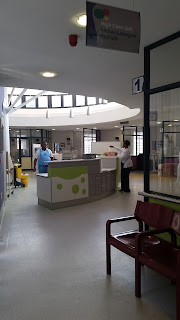So on Monday we had the day off since it was a national holiday, Women's Day, which from what I saw is actually much like Mother's Day, though they celebrate that too. But it seems it is a day to honor women, especially older women, ie. buying them chocolates and serving them tea :) We got our host mother pastries from the bakery. Other than that we did not do too much, just went to the cafe at the local mall and caught up on emails and work.
On Tuesday we had our registration to get our student ID cards for rotations at King Edward Hospital. We are technically rotating as students of the University of Kwa-Zulu Natal, which houses the largest medical school in this region. The process took a couple hours, and the international students department had a spectacular view.
In the evening we were treated to dinner by CFHI now that all of us are here. We went to a beautiful restaurant right on the water at a place called Wilson's Wharf. It would be a perfect date spot! :) We had a great time ~ I really enjoyed myself and I like the dynamic of the group of students I am with. I think it will be a great few weeks.
So then on Wednesday-Friday I had my rotation with the pediatrics clinic at King Edward. The hospital is very old, but there is a lot of construction going on and clear efforts at renovation. The pediatrics facility for example is brand new, state of the art, and I learned that it is due to the grant writing efforts of the director, Dr. Ramjee, who is the one we observed this week.
In terms of what we saw, there were a lot of burns and motor vehicle accidents, which reflects the public health issues I've seen so far. A lot of unattended fires and crazy drivers...people seem to love fire here. We will be driving at night and you can see at least 2-3 areas just glowing orange along the highway, with nobody around to watch it. And of course with the lack of trash organization a lot of people burn their trash, which leads to more safety hazards. As for drivers, there are these crazy mini bus taxis that drive like they own the road. It is not safe to drive on the far right lane of the highway (which would be our far left) because they randomly come to complete stops, and the same in the regular roads. There are just way too many road incidents...and children seem to suffer the most.
Apart from this, there were a lot of premature babies in the nursery, mostly due to HIV-related reasons. I was shocked at how tiny they were, little more than 1 kilo, or 2-3lbs. It was a tough thing to see, little weak bodies engulfed by diapers because they aren't even big enough to fill them yet. However, the facilities seemed very well managed, so I felt confident and hopeful. During rounds in the nursery, one of the mothers there with her newborn had a red eye where she'd clearly been hit. When the doctor inquired about it and insisted the woman see the nurse, she replied that she'd been assaulted. I've heard a lot of assault since I've been here, both from the doctors and personally from my host family and people I've met. Though I have traveled quite a bit and met many people and seen many places around the world, I've never been in a place where the crime and violence felt so real. It's unfortunate.
On Friday we were taken to the pediatric HIV clinic, which I found particularly interesting. I had never thought about the situation of children born with HIV and the implications for youth disclosure counseling and for later on when they become teenagers and sexually active. Due to the height of the epidemic several years ago, there is actually quite a large population of these youth. I witnessed several difficult counseling sessions in which the doctor had to navigate complex situations, talking to youth about using protection for sex, but of course they do not want to talk about it and it makes it worse when parents are present for the appointment. Disclosure about sexual activity then becomes almost impossible, but it is so important to talk about it to promote safe sex and stop transmission. One patient unfortunately suddenly became resistant to first line therapy after 14+ years, and it is likely due to exposure to another strain of HIV. And second line therapy is pretty brutal with all manner of side effects including nausea and vomiting, not to mention the 9 pills/day. We were also invited to a meeting in the afternoon to which all the health care workers came to discuss difficult cases in an interdisciplinary approach. The team included the social workers, nurses, doctors and even the pharmacists. I really thought this was a great approach, because HIV is not a purely medical issue. In fact, it is probably mostly social and has everything to do with the family, friends, relationships, dealing with social stigma, etc. so it makes sense that the social worker be involved in coming up with a strategy for difficult patients. Even the pharmacists contributed by discussing different regimens for patients with trouble adhering to medication. Overall this was my favorite part of this week's rotation :)









No comments:
Post a Comment